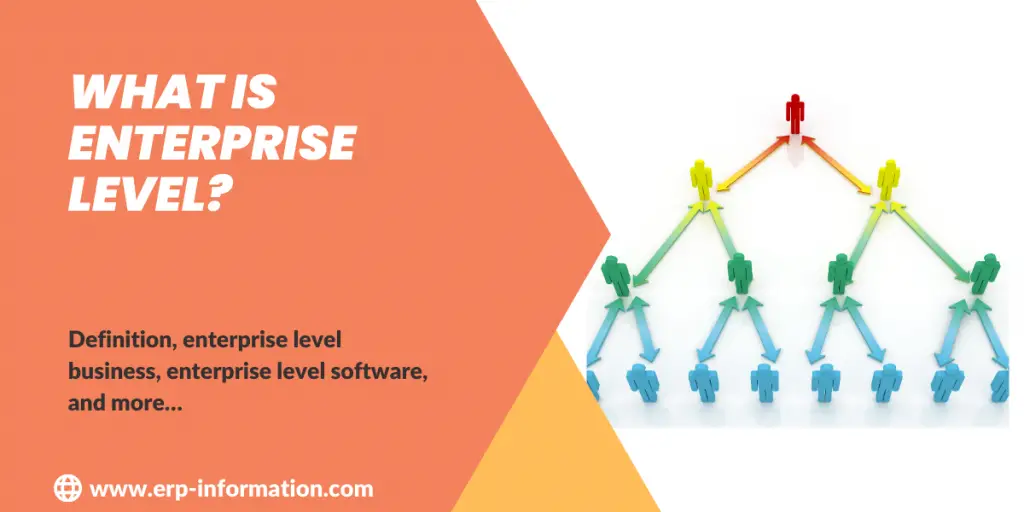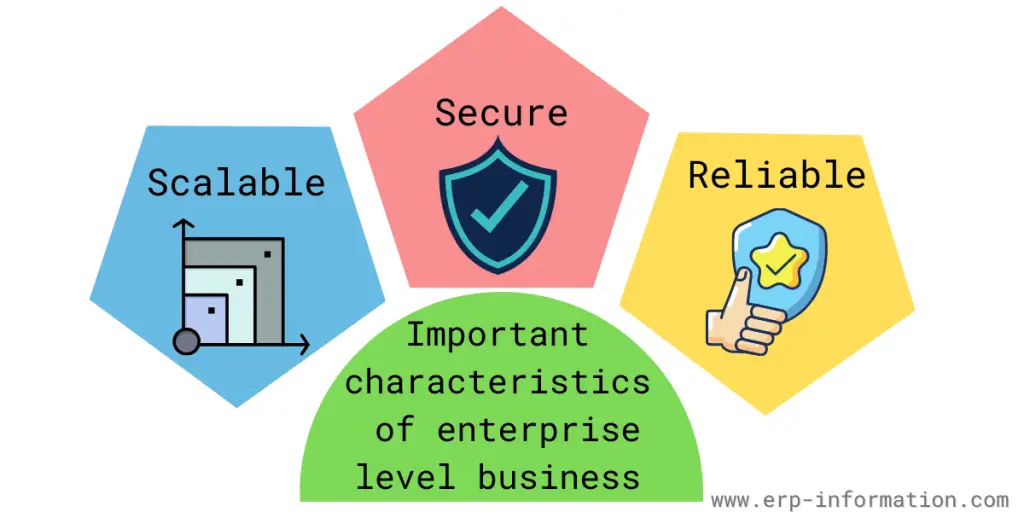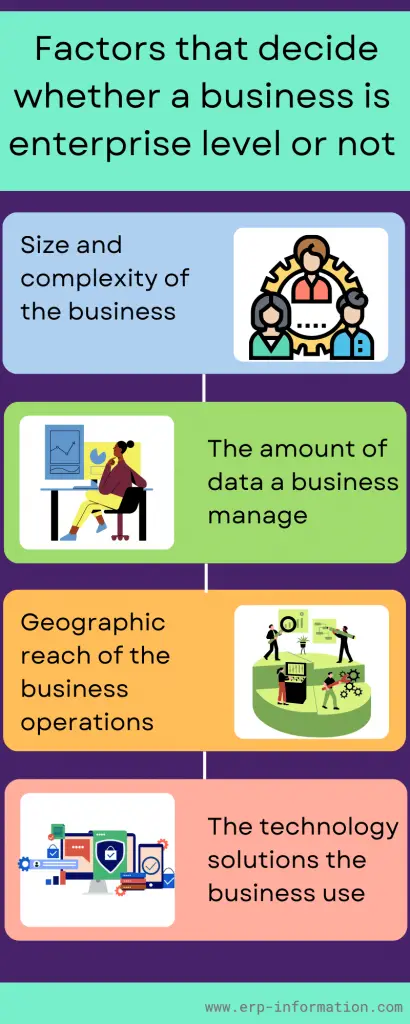Imagine yourself as a budding entrepreneur looking to elevate your business. One of your business partners recommends the adoption of enterprise-level technologies to support an expansive array of applications and services.
The term “enterprise-level” may seem daunting initially, but fear not. We’re here to demystify this concept for you.
This blog post will define enterprise level, enterprise level business, and its characteristics. Enterprise level is a term used to describe large businesses with much revenue. The post also discusses enterprise level software and how to implement them in your business.
What is enterprise level?
Enterprise level refers to a business and technology platform that provides powerful tools to help businesses manage their operations. In other words, it refers to the capacity of a tool or application to provide complex services.
Enterprise level software is designed specifically for large and complex organizations, offering an array of features such as improved security, scalability, robustness, and support capabilities.
In addition, the enterprise level provides an integrated suite of solutions in areas such as enterprise resource planning.
What is enterprise level business?
Enterprise level business refers to large-scale operations involving multiple departments, locations, and customers. This type of business typically requires enterprise level software and systems to manage its vast amount of associated data.
Such businesses often have larger budgets than smaller organizations, meaning they can invest in infrastructures, such as enterprise level software and systems, that smaller companies may be unable to afford.
This can provide a competitive edge in the marketplace and help them increase their profits. Enterprise level businesses also often have access to more resources than small companies, such as larger networks of potential partners and customers.
Overall, enterprise level business is a complex operation requiring many resources and attention. By investing in enterprise level software and systems, businesses can ensure they have the tools to stay ahead of their competition and succeed.
What are the characteristics of an enterprise level business?
Enterprise-level businesses typically have more complex requirements than smaller businesses, as they must handle many customers, a wide range of data, and multiple internal teams.
To meet these needs, they require robust technology solutions that can scale with the size of their operations.
The most important characteristic of an enterprise-level business is its ability to offer scalable solutions. In addition, enterprise-level businesses should be able to handle many customers and processes while remaining secure and reliable.
Another important characteristic of an enterprise-level business is its focus on customer service. These organizations must be able to provide reliable technical support and quick response times when issues arise.
They should also be able to offer personalized services to meet the needs of their customers, including custom solutions and tailored support.
Finally, enterprise-level businesses must also be able to carry on with the ever-changing technology landscape. That means their solutions must constantly evolve and improve to stay ahead of the competition.
In addition, they should have a solid understanding of emerging technologies and trends to provide innovative solutions for their customers.
How can you determine if your business is enterprise level or not?
When considering whether your business is enterprise-level, it is important to assess factors like the size and complexity of your organization, the amount of data you manage, the geographic reach of your business operations, and the technology solutions you use.
Size and complexity
Business size can be a major factor in determining if a company is enterprise-level. Generally, companies with many employees and departments are considered enterprise-level businesses, as they typically require additional resources and expertise to manage operations at this scale.
Amount of data
Additionally, your company’s data can also be indicative of an enterprise-level business. For example, companies that handle massive amounts of information daily, such as data centers and financial institutions, often require enterprise-level software solutions to manage and secure their data.
Geographic reach
The geographic reach of your business can also be a determining factor at the enterprise level. For example, companies operating in multiple countries or regions may need additional resources to handle customer support, market research, and other activities on a global scale.
Technology solutions
Finally, the type of technology solutions your company uses can be a telltale sign of enterprise-level status. For example, companies that utilize enterprise-level business software such as ERP, CRM, and HRMS systems are typically considered enterprise-level.
That is because these solutions often require additional investments in hardware and personnel to maintain and troubleshoot.
Assessment of your business’s size, data management, geographic reach, and technology solutions helps you decide whether or not it is enterprise-level.
Companies that meet these criteria are usually well-equipped to handle complex operations and grow their business successfully.
What is enterprise level software?
Enterprise-level software is a type of software used by businesses of all sizes. It typically offers more features, scalability, and customization than standard consumer-grade software.
It also includes analytics, automation, and integration capabilities, making it easier for users to manage their operations and data.
The enterprise-level software is designed to meet the specific needs of businesses, such as managing large databases and creating enterprise-wide networks. Enterprise-level software usually requires more technical expertise and knowledge to operate.
It can allow businesses to streamline business processes, improve security, reduce costs, and increase efficiency.
As a result, it is often used in healthcare, finance, manufacturing, government, and other industries requiring large amounts of data storage and management.
With the aid of enterprise-level software, businesses can access advanced features and technologies usually unavailable with consumer-grade products.
For example, it allows for custom integrations, automated processes, and sophisticated analytics capabilities. By taking advantage of enterprise-level software, businesses can optimize their operations and make better and faster decisions.
Reasons to use enterprise level solutions
Enterprise-level solutions can be expensive and complex to implement. However, the benefits of using enterprise-level solutions often outweigh the costs when implemented for the right requirements.
For example, ERP software can help businesses to improve their efficiency and productivity, while CRM software helps businesses to improve their customer relationships.
Here are some reasons why businesses need to use enterprise-level solutions:
Scalability
Enterprise-level solutions are designed to scale with businesses as they grow. That means businesses can add new users, data, and functionality without worrying about the solution slowing down or crashing.
Security
They typically have robust security features that protect businesses from cyberattacks and data breaches. That is important for businesses of all sizes, especially large enterprises that handle sensitive data.
Reliability
These solutions are typically developed and supported by large software companies. That means businesses can be confident that the solution will be reliable and that they will have access to support if needed.
Integration
Enterprise-level solutions can be integrated with other enterprise systems, such as ERP and CRM. That makes it easier for businesses to streamline their workflows and get a complete view of their operations.
Performance
These solutions are typically designed to handle high volumes of data and transactions. That means businesses can improve their performance and efficiency using enterprise-level solutions.
Benefits of upgrading to enterprise-level software
Upgrading to enterprise-level software can provide many benefits for businesses.
Powerful platform
It provides a powerful platform for running software, allowing companies to access more complex applications, store larger amounts of data, and handle more intensive business processes.
Secure and reliable
Enterprise-level software solutions are also designed to be highly secure and scalable to meet businesses’ needs as they grow and change.
That makes them an ideal choice for businesses that anticipate future growth or have many users accessing the software.
Cost-effective
On top of all this, enterprise-level software solutions are often more cost-effective than other options. They may require a significant upfront investment, but the long-term savings can be substantial.
In addition, by investing in a unified enterprise-level solution, businesses can benefit from lower operational costs and improved efficiency.
Ultimately, upgrading to enterprise-level software offers many advantages for businesses of all sizes.
From increased performance and security to cost savings and scalability, enterprise-level solutions provide the power, flexibility, and stability needed to succeed in today’s competitive market.
With the right enterprise-level solution, businesses can take their operations to the next level.
The bottom line is that an enterprise-level software upgrade can help your business reach its goals. In addition, investing in an enterprise-level solution can help you get ahead of the competition and ensure that your business remains competitive for years to come.
Steps to upgrade enterprise level software
Below are the steps for assessing and implementing enterprise software:
- Assess your current software environment, identifying versions, integrations, and existing systems.
- Identify your specific needs and goals for upgrading the software.
- Research and explore different software solutions available in the market.
- Develop a comprehensive plan with a timeline, budget, and necessary resources.
- Communicate and involve stakeholders throughout the upgrade process.
- Thoroughly test the new software to identify and resolve any potential issues.
- Train employees on how to use the latest software effectively.
- Monitor the software post-implementation to ensure it meets expectations and functions without problems.
FAQs
What is enterprise risk management?
Enterprise risk management is a way for company leaders to figure out what risks their business faces. This includes money, credit, fraud, strategy, and operations risks. They have to identify these risks and think of ways to reduce them.
What does enterprise-level mean in sales?
Enterprise sales is a strategy used when selling to big companies and clients with bigger contracts. It usually takes longer than other sales strategies; there are more people involved, and there is more risk.
What is enterprise-level management?
Enterprise management is a way for businesses to keep track of important everyday activities like managing items, money, employees, and customers.
How did large enterprises have successfully implemented enterprise-level solutions?
Example 1: Walmart’s use of ERP software
Walmart is one of the largest retailers in the world, with over 11,000 stores in 27 countries. The company uses SAP ERP software to manage its complex supply chain and inventory management system.
SAP ERP helps Walmart track its products from when they are ordered from suppliers to when they are sold in stores. That helps Walmart to ensure that it has the right products in the right stores at the right time.
Example 2: Salesforce’s use of CRM software
Salesforce is a leading provider of CRM software. The company uses its CRM software to manage its sales pipeline, customer relationships, and marketing campaigns.
Salesforce CRM helps Salesforce to track all customer interactions, identify and target new customers, and automate the sales process. That helps Salesforce to close more deals and improve customer satisfaction.
Conclusion
Enterprise-level refers to the ability to handle complex processes. Enterprise-level platforms are the backbone of large organizations, driving their efficiency and success.
They provide the tools and technology needed to manage resources, streamline operations, and adapt to ever-changing business environments. These platforms not only aid growth in technology but they also help achieve strategic goals while maintaining high standards of performance.
As the business world evolves, enterprises must continually embrace innovation and adapt to stay competitive. By harnessing the power of these enterprise level platforms, they can remain at the forefront of their industries and continue to thrive in a dynamic and challenging global market.


